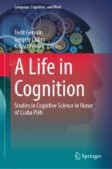Search
Search Results
-
Between social cognition and material engagement: the cooperative body hypothesis
In recent years, social cognition approaches to human evolution and Material Engagement Theory have offered new theoretical resources to advance our...
-
Intersubjectivity and Second-Person Perspective
Phenomenologists have developed theories of empathy, intersubjective understanding, and communication. Notions of transcendental intersubjectivity...
-
Social Cognition and Autism Spectrum Disorders: From Mindreading to Narratives
In this chapter I will work on the crucial role of semiotic narratives for social cognition. I will try to stress the key position that a semiotic...
-
An Externalist Theory of Social Understanding: Interaction, Psychological Models, and the Frame Problem
I put forward an externalist theory of social understanding. On this view, psychological sense making takes place in environments that contain both...
-
Intentionality, pointing, and early symbolic cognition
Concepts such as “symbolism” and “symbolic cognition” often remain unspecified in discussions the symbolic capacities of earlier hominins. In this...

-
Phenomenology of social explanation
The orthodox view of social cognition maintains that mentalizing is an important and pervasive element of our ordinary social interactions. The...
-
Enactivist Theories
For a long time, the theory-theory, modularity-theory and simulation-theory have dominated the debate on social cognition.. In this chapter, we look...
-
What We Do and Don’t Know About Joint Attention
Joint attention is an early-emerging and uniquely human capacity that lies at the foundation of many other capacities of humans, such as language and...
-
Social cognition, mindreading and narratives. A cognitive semiotics perspective on narrative practices from early mindreading to Autism Spectrum Disorder
Understanding social cognition referring to narratives without relying on mindreading skills has been the main aim of the Narrative Practice...
-
Leadership and Followership
An important way for leaders to relate to followers is via empathy. It shows sensitivity to followers, pays attention to their needs, listens...
-
Social Cognition: a Normative Approach
The main aim of this paper is to introduce an approach for understanding social cognition that we call the normative approach to social cognition....
-
Gendered Theory of Mind: A Linguistic and Literary Approach
In this chapter, we explore the relationship between ToM and gender using linguistic knowledge and literary samples, as both help us to cover the...
-
Mind To Be and the Relational World
This chapter focuses on how relationality shifts subjectivity and mental behavior in general. Consistent with this theme, it begins by summarizing...
-
Preschoolers’ Sensitivity to the Infringement of Conversational Maxims in View of Mentalization
The present chapter aims to clarify the existing associations between social cognitive skills and a productive pragmatic competence enabling the...
-
Embodied Agents
A theory of what it is to be an agent acting for reasons is given. This picture could apply to non-linguistic creatures, but having language allows...
-
Mirror Neurons, Prediction and Hemispheric Coordination: The Prioritizing of Intersubjectivity Over ‘Intrasubjectivity’
We observe that approaches to intersubjectivity, involving mirror neurons and involving emulation and prediction, have eclipsed discussion of those...
-
Modest Sociality, Minimal Cooperation and Natural Intersubjectivity
What is the relation between small-scale collaborative plans and the execution of those plans within interactive contexts? I argue here that joint...
-
Why the extended mind is nothing special but is central
The extended mind thesis states that the mind is not brain-bound but extends into the physical world. The philosophical debate around the thesis has...
-
Intentionalities
What methods are used by phenomenologists? This chapter explains the ‘natural attitude’ and reviews the classic methodological steps involved in...
